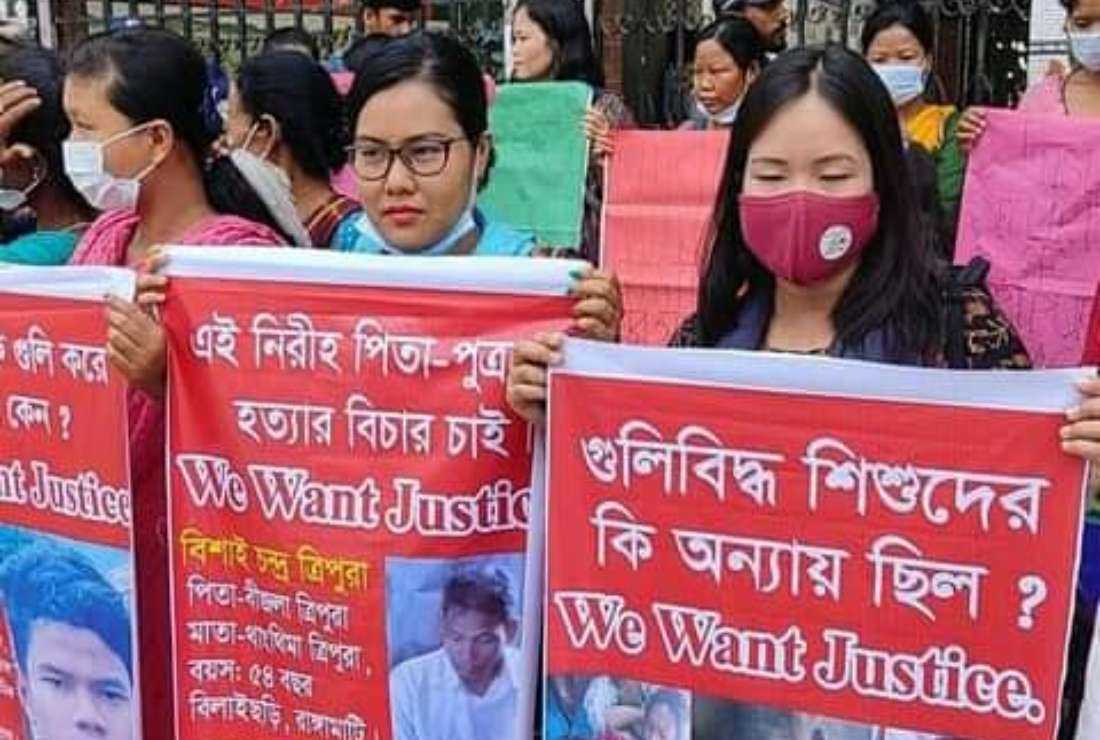
Members of ethnic Tripura community form human chain in Bandarban district of Bangladesh's Chittagong Hill Tracts to demand justice for killings of community members on July 3. (Photo supplied)
Hundreds of ethnic Tripura people marched on the streets demanding justice and compensation for the families of three of their men shot dead by an armed rebel group in Bangladesh's restive Chittagong Hill Tracts (CHT).
The Tripura Welfare Association organized a human chain on July 3 to protest the June 21 killing by an insurgent group called Kuki-Chin National Front in the Bilachhari area of the Rangamati district.
The gunmen fired indiscriminately killing two members of the same family, reports said. Another person was shot and then hacked to death, while two children were seriously injured.
The CHT, which includes three hilly and forested districts of Khagrachhari, Bandarban and Rangamati, continues to be restive despite the government signing an accord in 1997 to end more than two decades of deadly insurgency.
The latest violence has spread panic among tribal people, some local people say.
Nidharam Tripura and five members of his family sought shelter in a relative's house after fleeing the village and two days later he heard that four of his neighbors had been killed.
"I can't say how many shots were fired that evening ... I quickly ran to my relative's house,” Tripura told UCA News.
“We are not safe anywhere now. The terrorists have been threatening us for the last few months and they are demanding various resources from us. Now we want protection by the government,” the 49-year-old Baptist said.
"No effective action has yet been taken by the government against the terrorists which is extremely worrying"
The Kuki-Chin National Front (KNF) and its armed wing, the Kuki-Chin National Army (KNA), are fighting for the rights of the Zo (or Zomi) people. The KNF considers the Bawm, Lusai, Pangkho, Khyang, Khumi and Mru ethnic groups which inhabit the CHT as Zo people.
Many have made unverified claims that the KNF is backed by the government to create unrest among the various hill tribes.
“Despite the KNF's acknowledgment of the killings and its subsequent eviction, no effective action has yet been taken by the government against the terrorists. It is extremely worrying,” the Jana Samhati Samiti (JSS) said in a statement on July 3.
"We demand the government take strict action against the KNF and arrest the terrorists and bring them before the law as well as provide necessary security for the victims and rehabilitate them in their respective villages with proper compensation,” the statement said.
The JSS is the largest and most influential ethnic political organization in the CHT. It signed a peace agreement with the government in 1997 and members of its armed wing, the Shanti Bahini, laid down their arms.
The peace accord brought an end to more than two decades of armed struggle between the military and the JSS which sought autonomy for the hill tribes. Thousands were killed in the bush war including JSS members, soldiers and civilians.
While JSS's armed insurgency sought greater autonomy for hill tribes, it was also a violent response to state-sponsored large-scale migration of Bengali Muslims on the hills for a demographic change in the largely tribal region.
A JSS splinter group opposed the peace treaty and formed the United People's Democratic Front (UPDF), triggering a turf war between the two groups. The groups have seen further splits in recent years, intensifying violence.
Christians make up a tiny minority of the estimated 1.6 million people in the CHT. About two-thirds of the estimated 30,000 Catholics in the Chittagong archdiocese hail from different hill tribes, mostly the Tripura community.
“Although almost all Catholics in the hills are from the Tripura community, the area is extremely inaccessible and our presence is banned by the administration,” said a Church official, speaking on condition of anonymity.
“Such killings happen frequently in the CHT and this is hindering our mission. But we have to work here accepting everything. Strong action by the government is needed for peace in the mountains and there is no alternative to emphasizing dialogue,” the official told UCA News.
About two weeks after the incident, the father of a victim filed a case against 25-30 people at Bilaichhari police station.
“Police are conducting an all-out operation to arrest the accused,” Mohammad Alamgir, head of Bilaichhari police station, told UCA News.


